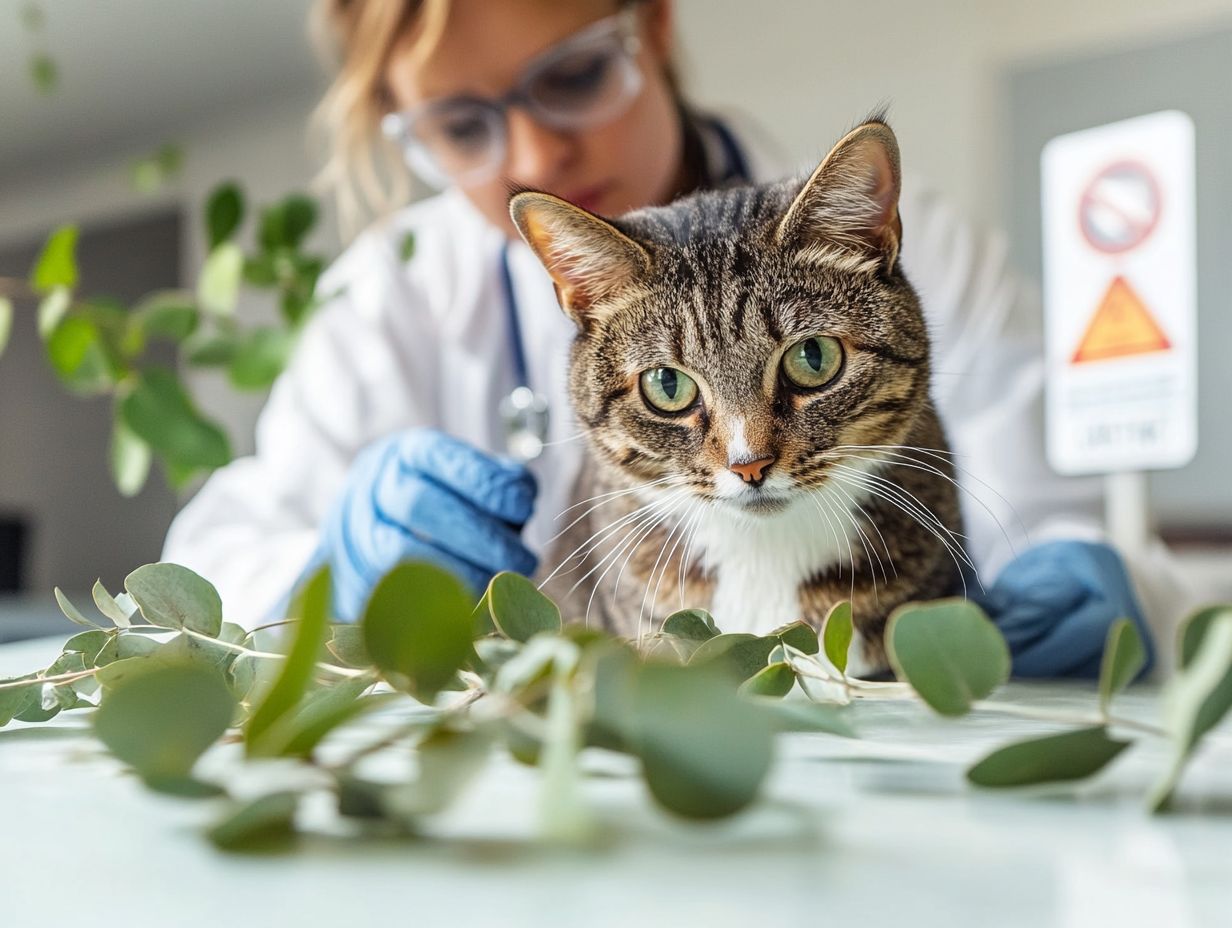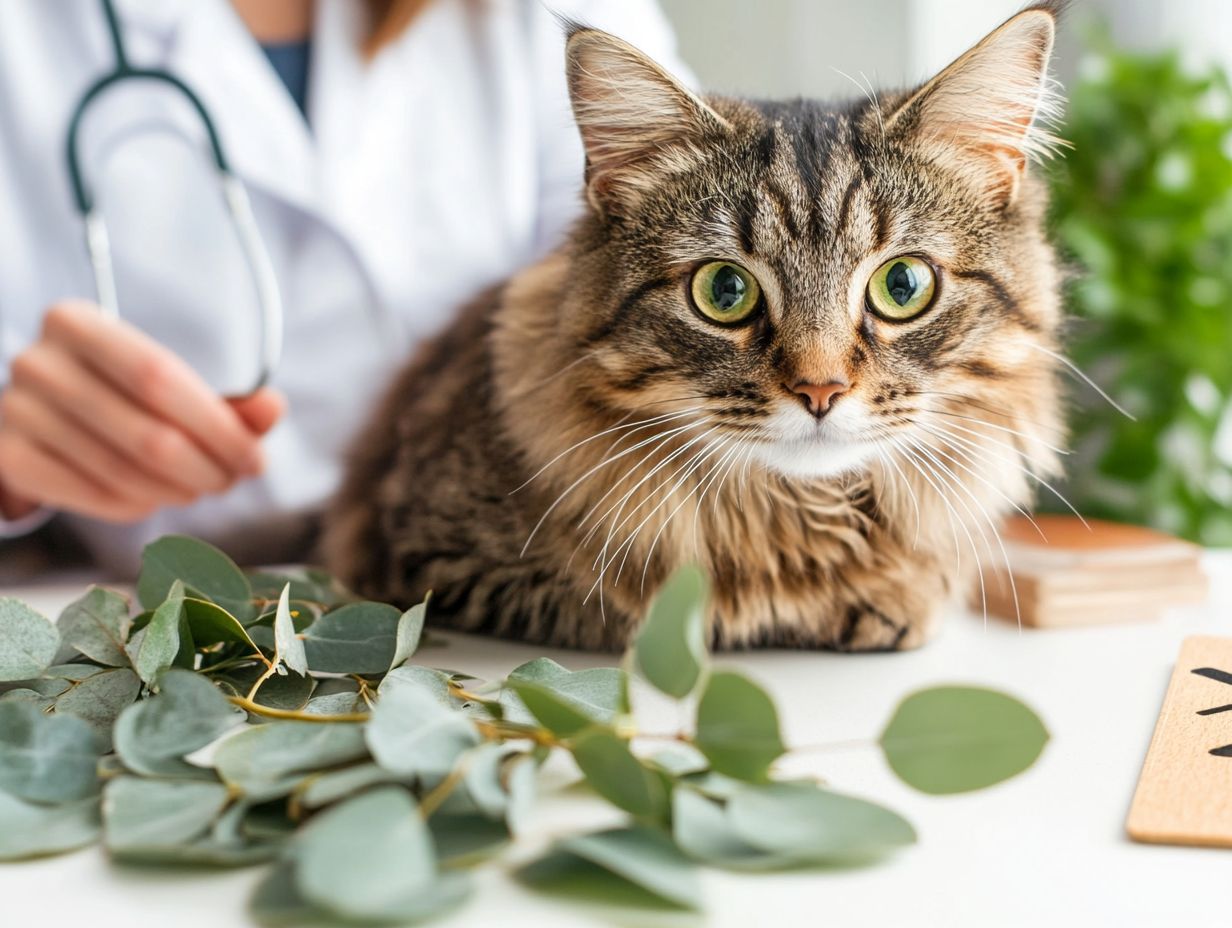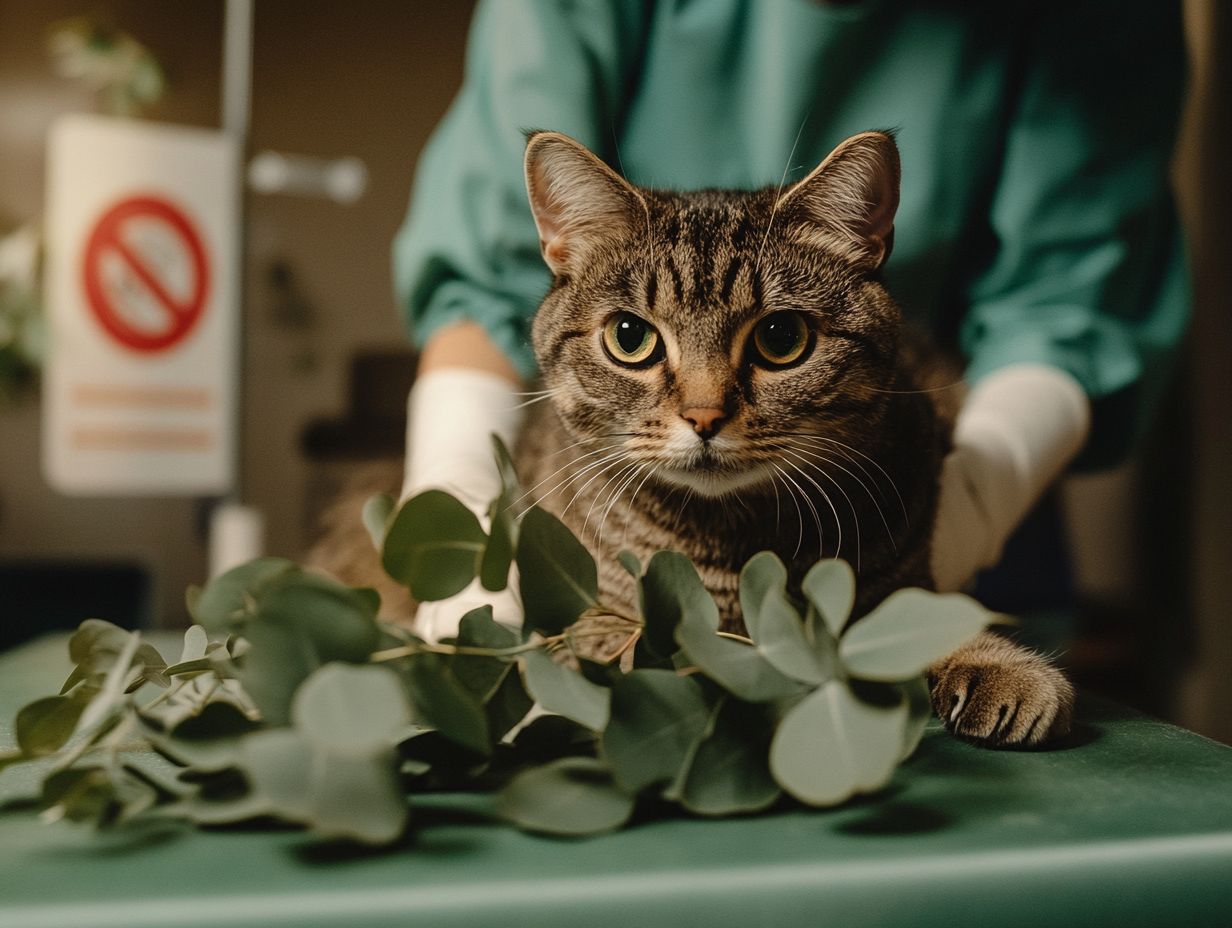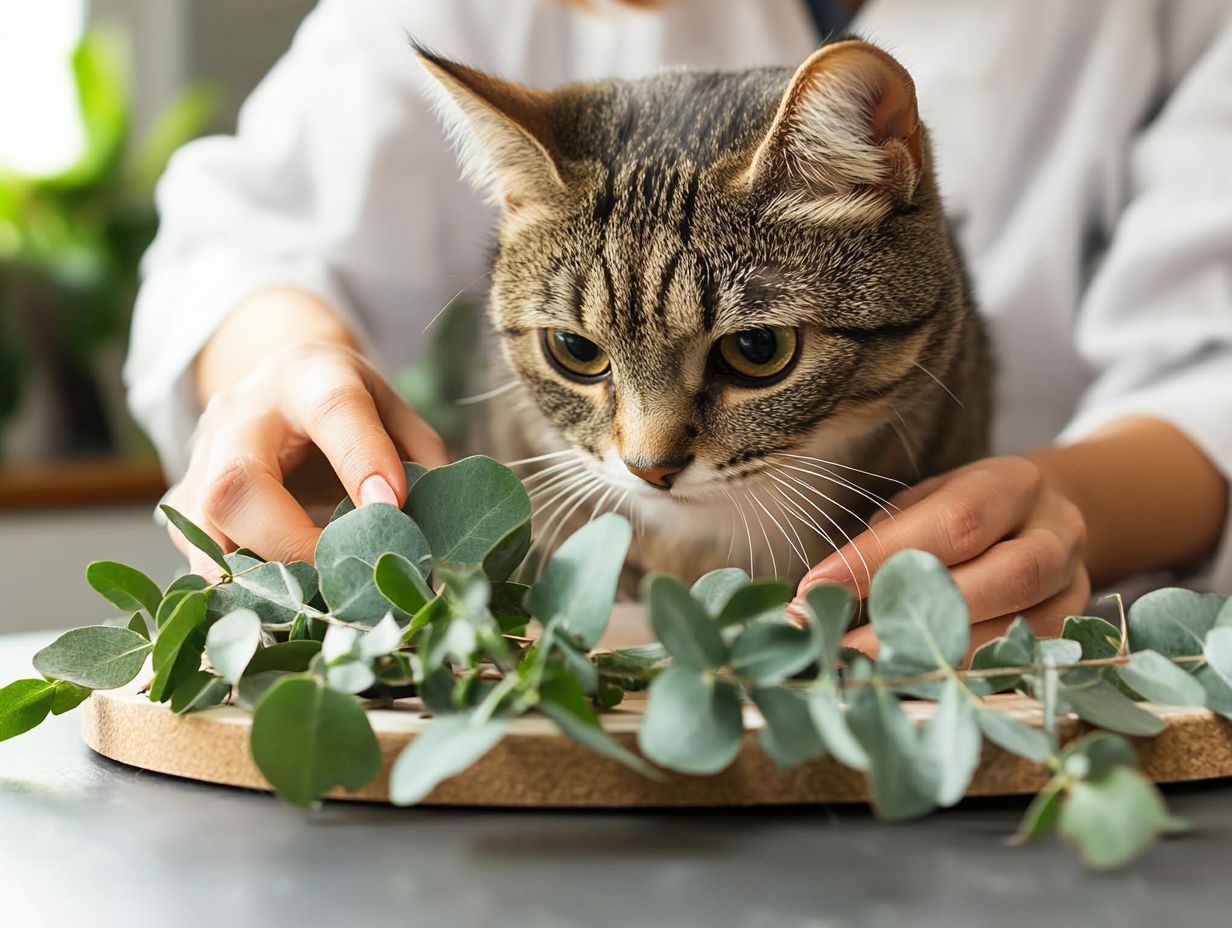Eucalyptus, known for its refreshing scent and medicinal properties, can pose hidden dangers for our feline friends, particularly due to essential oils. It is considered toxic to cats, especially the leaves and essential oils, which can cause serious health issues.
As pet owners, it’s crucial to understand the various types of eucalyptus, their safety, and potential risks for cats, including essential oil toxicity. Specific toxic compounds found in eucalyptus, such as eucalyptol and 1,8-cineole, are known to be harmful to cats.
This article will explore whether eucalyptus is safe for cats, the symptoms of essential oil poisoning, and what to do if your cat ingests it. We’ll also share tips on keeping your cat safe from this plant. Read on to ensure your furry companion stays healthy and happy!
Key Takeaways:

What is Eucalyptus?
Eucalyptus is a genus of trees and shrubs recognized for their aromatic leaves, which are processed into essential oils offering various health benefits. However, its safety, particularly around animals such as cats, must be carefully considered due to the potential negative effects on their health condition.
The oil extracted from these leaves contains a range of compounds known for their calming properties, making it a popular choice for promoting wellness. Eucalyptus essential oil is commonly used in aromatherapy and is believed to support respiratory health while providing anti-inflammatory benefits. Yet, it poses significant risks to pets.
What are the Different Types of Eucalyptus?
There are many species of eucalyptus, each producing essential oils with distinct therapeutic properties. Eucalyptus globulus, commonly known as blue gum, has a strong menthol-like scent that is beneficial for respiratory issues, while Eucalyptus radiata, or narrow-leaved peppermint, has a milder aroma.
However, it’s important to be cautious, as is eucalyptus dangerous for cats? A vet’s warning on potential risks should be considered.
Is Eucalyptus Safe for Cats?
Eucalyptus is unsafe for cats, as exposure to its essential oil can result in essential oil toxicity, posing risks to their health and well-being. Symptoms can range from mild to severe, including liver metabolism issues.
What are the Potential Risks of Eucalyptus for Cats?
The potential dangers of eucalyptus for cats include essential oil poisoning, which can lead to a range of signs and symptoms. Mild exposure can cause symptoms such as vomiting, lethargy, and respiratory distress. In severe cases, it may result in liver damage.
Additionally, concentrated extracts can cause chemical burns if ingested or used improperly. This underscores the importance of pet owners being aware of these risks and ensuring that products containing eucalyptus are kept out of reach.
What are the Symptoms of Eucalyptus Poisoning in Cats?

Symptoms of eucalyptus poisoning in cats can include:
- Mild Symptoms: Drooling, vomiting
- Moderate Symptoms: Difficulty breathing, lethargy, gastrointestinal issues such as diarrhea or abdominal pain
- Severe Symptoms: Behavioral changes including increased agitation or confusion
All of these symptoms require immediate veterinary care. Seeking help promptly can be critical for your cat’s recovery.
First Aid and Treatment Instructions
If you suspect your cat has ingested eucalyptus:
- Remove any remaining eucalyptus products from your cat’s vicinity.
- Contact your veterinarian or a pet poison control hotline immediately.
- Follow their advice and prepare to provide information about your cat’s symptoms and any eucalyptus exposure.
- Do not induce vomiting unless directed by a veterinary professional.
Prevention Tips
To keep eucalyptus out of reach of your cats:
- Store essential oils in closed cabinets or high shelves away from pets.
- Use barriers or gates to limit access to areas where eucalyptus plants are located.
- Educate yourself and others in your household about the risks associated with eucalyptus.
Addressing Misconceptions
Many believe that all plants with medicinal properties are safe for pets. This is a myth; always research any plant before introducing it into your home if you have pets.
Balanced Perspective
While eucalyptus has potential benefits in a controlled environment, such as diluted oil in diffusers, the risks involved, especially to pets, must be recognized.
Special Considerations
Kittens and senior cats may have compromised health and could be more susceptible to the toxic effects of eucalyptus. Extra caution is advised when these vulnerable groups are present.
Expert Input
Veterinarians urge pet owners to be vigilant about the plants they keep in their homes. They stress that eucalyptus, despite its medicinal properties, is not safe for cats.
Emergency Contact Information
For emergencies, contact a pet poison control hotline such as the ASPCA Animal Poison Control at (888) 426-4435.
Disclaimer: This article is for informational purposes only and should not replace professional veterinary advice. Always consult your veterinarian for concerns regarding your pet’s health.
Regular Updates Note: This content will be regularly reviewed and updated as new research emerges. Last reviewed on: [insert date].
For further reading, explore related topics such as other common plants toxic to cats.
It is crucial for cat owners to closely monitor their pets, as even minor signs of distress can escalate rapidly. Prompt veterinary intervention can be life-saving, as the toxic components of eucalyptus, specifically eucalyptus oil and 1,8-cineole, can lead to severe respiratory distress or neurological effects if allowed to progress. According to the ASPCA, eucalyptus is considered toxic to cats.
Early diagnosis and treatment are essential for ensuring a positive outcome for any cat that may have ingested this hazardous plant.
What to Do if Your Cat Ingests Eucalyptus?
If your cat has ingested eucalyptus, you should contact your veterinarian immediately to discuss the symptoms and determine the next steps regarding potential essential oil poisoning.
1. Call Your Veterinarian
If you suspect that your cat has ingested eucalyptus, the first and most important step is to contact your veterinarian, as they can provide guidance specific to your cat’s situation.
In emergencies like this, it is crucial for cat owners to assist the veterinary team by quickly providing as much relevant information as possible. Describing the symptoms your cat is exhibiting—such as vomiting (mild), lethargy (mild), increased heart rate (moderate), or difficulty breathing (moderate)—helps the veterinarian assess the seriousness of the situation.
Additionally, informing them about the amount of eucalyptus your cat consumed allows for a more effective treatment plan. For this reason, it is wise to keep your veterinarian’s contact information readily accessible so you can act swiftly in the event that your cat’s health is endangered.
2. Monitor Your Cat’s Behavior
Monitoring your cat’s behavior after eucalyptus exposure is crucial, as it can help you identify early signs of distress that may assist your veterinarian in assessing the severity of the poisoning.
Changes in appetite and energy levels are the two most important behaviors to observe, as a sudden decline in either can signal a more significant issue. Additionally, pay attention to changes in vocalizations, lethargy, or alterations in grooming habits.
- Mild Symptoms: Vomiting, mild lethargy
- Moderate Symptoms: Increased heart rate, difficulty breathing
- Severe Symptoms: Seizures, extreme lethargy
Symptoms such as vomiting, diarrhea, and difficult breathing indicate immediate distress and require urgent veterinary attention.
By keeping a close watch on your cat’s behavior, you can act swiftly, potentially saving your pet’s life by addressing a problem before it escalates into a more serious situation.
3. Provide Supportive Care
After your cat has been exposed to eucalyptus, supportive care involves keeping them hydrated and comfortable while you await veterinary attention. You can encourage hydration by prompting them to drink water or an electrolyte solution designed for pets, which helps prevent dehydration.
Creating a calm and quiet environment will also reduce stress, so minimize outside noise and provide a comfortable space for them to relax. Additionally, carefully monitor your cat for any signs of worsening symptoms, such as respiratory distress, lethargy, or vomiting.
This vigilant observation can help catch complications early and ensure your companion remains as comfortable and safe as possible during this time. For more information on potential risks, visit Is Eucalyptus Dangerous for Cats? A Vet’s Warning on Potential Risks.
How to Keep Your Cat Safe from Eucalyptus?

To protect your cat from the dangers of eucalyptus, avoid using eucalyptus products in your home and be mindful of where you place eucalyptus plants.
1. Avoid Using Eucalyptus Products in Your Home
Avoiding eucalyptus products in your home is important because many essential oils can be harmful to pets. This includes common household items, such as essential oil diffusers, which may emit harmful vapors that curious cats can easily inhale.
Eucalyptus extract is often found in various household cleaning products and can be dangerous if ingested or absorbed through the skin. It is crucial to note that some topical treatments designed for humans may contain eucalyptus, and these should be checked to prevent accidental exposure to your pet’s skin or fur.
Always read the labels carefully and choose pet-safe options whenever available, avoiding products like tea tree oil, lavender oil, and citrus oils.
2. Keep Eucalyptus Plants Out of Reach
Ensuring that eucalyptus plants are kept out of reach is crucial for pet safety, as even the leaves can pose a risk of toxicity if ingested by cats. Creating an effective display can enhance safety while allowing you to enjoy your greenery.
Common Safe Alternatives: Consider using plants like cat grass or spider plants that are non-toxic to cats.
For more detailed information on eucalyptus toxicity and safe practices, please refer to resources from the Pet Poison Helpline.
Disclaimer: This content is for informational purposes only and is not a substitute for professional veterinary advice. For any emergencies, please consult your veterinarian.
Using hanging planters can elevate plants off the floor, keeping them above your pets’ reach and protecting them from accidental harm. High shelving or unique wall-mounted holders can introduce a striking design element without endangering your pets.
It’s essential to carefully select plant types, as some can be harmful to animals; therefore, researching your green companions is necessary before bringing them home. By combining decorative height with knowledge of toxicity, you can cultivate a thriving, healthy indoor ecosystem.
Understanding Eucalyptus Oil Toxicity
Eucalyptus oil is toxic to cats. The toxic parts of the plant include the leaves and the oil. Key toxic compounds found in eucalyptus oil are eucalyptol and 1,8-cineole, which are harmful to cats.
3. Use Alternative Cat-Safe Products
The solution to the question of what products to use on cats in place of eucalyptus and other toxic oils is to opt for alternative cat-safe products that help maintain a clean environment without the associated dangers, such as using diluted essential oils with a carrier oil for flea repelling.
Eucalyptus and other toxic oils should be replaced with non-toxic, gentle, plant-based cleaners that have light scents, such as lavender or chamomile. These scents not only create a calming atmosphere but also possess noted calming properties and anti-inflammatory effects.
Additionally, all-natural air fresheners made with ingredients like baking soda and diluted essential oils safe for pets can enhance the home environment while promoting wellness and mood improvement for both pets and their owners.
Additional Resources
Pet owners seeking to learn more about essential oil toxicity and safe practices for using oils around pets can access various resources. Veterinarians and organizations like the BC SPCA provide instructions and treatment protocols to avoid essential oil poisoning (source).
Additionally, the ASPCA’s Animal Poison Control Center offers a website with information on specific essential oils that can have negative effects on animals. Articles written by holistic veterinarians can guide pet owners on the safe use of aromatherapy in the presence of animals, including safety precautions and avoid using instructions.
Poison control hotlines are also valuable resources to have on hand in case of emergencies related to essential oil uses. Ultimately, consulting with professionals is the most reliable approach, as they can provide recommendations tailored to the specific health condition and sensitivity needs of individual pets, ensuring pet safety.
Frequently Asked Questions

Is Eucalyptus oil dangerous for cats?
Yes, eucalyptus oil can be dangerous for cats if ingested or exposed to in large amounts. It contains toxic oils that can be harmful (source).
What are the potential risks of eucalyptus oil for cats?
- Mild symptoms: Gastrointestinal upset, vomiting.
- Moderate symptoms: Lethargy, coordination issues.
- Severe symptoms: Neurological symptoms, liver damage, respiratory distress.
How can eucalyptus oil harm cats?
Cats can be harmed by eucalyptus through ingestion, inhalation, or direct skin contact. The essential oils in eucalyptus can irritate their digestive system, skin, and respiratory system, posing an inhalation risk.
What should I do if my cat has ingested or come into contact with eucalyptus oil?
- Remove your cat from the area with eucalyptus oil.
- Contact your veterinarian immediately.
- If possible, provide details about the exposure: amount, time, and symptoms.
- Do not induce vomiting unless directed by a veterinarian.
Can cats benefit from eucalyptus in any way?
No, eucalyptus is not safe for cats and does not offer any known health benefits for them. It is best to keep eucalyptus products away from cats to prevent any potential risks.
Are there any alternatives to eucalyptus oil for pest control or aromatherapy for cats?
Yes, there are many safe alternatives for pest control and aromatherapy for cats, such as rosemary oil and citrus oils. It is always best to consult with your veterinarian before using any products on or around your cat, ensuring product safety.
Common Myths About Eucalyptus and Cats
Many believe that eucalyptus can be harmless or even beneficial for pets. However, it is essential to understand that these beliefs are incorrect and can lead to serious health issues for your cat.
Special Considerations
Be cautious of eucalyptus exposure in kittens, senior cats, or cats with pre-existing health conditions, as they may be more susceptible to its harmful effects.
Emergency Contacts
If you suspect your cat has been poisoned, please contact:
- ASPCA Poison Control: 1-888-426-4435
- Your local veterinarian: [Insert local contact]
Disclaimer: This content is for informational purposes only and is not a substitute for professional veterinary advice. Always consult with a veterinarian for specific concerns.
Regular content reviews will be conducted to ensure the information remains current as new research emerges.